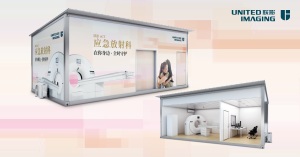por
John R. Fischer, Senior Reporter | March 02, 2020

United Imaging Healthcare has donated $7 million worth of equipment - including its Emergency radiology departments - to help in the coronavirus epidemic
United Imaging Healthcare has deployed $7 million worth of devices and services, including its Emergency radiology departments (Emergency RDs) to providers in the Wuhan region of China to help in the ongoing COVID-19 (commonly known as novel coronavirus) epidemic.
The Shanghai-based organization designed the solution specifically for mobile cabin hospitals (MCHs), which are essentially makeshift medical environments set up in sports centers, exhibition halls and schools to treat thousands of coronavirus patients with mild symptoms. UIH also plans to donate another $7 million worth of devices and services to the Henan Province.
“We based our deployment on the actual coronavirus situation and needs from hospitals in China, which change frequently,” Dr. Xue Min, chairman and CEO of United Imaging, told HCB News. “Currently, we have deployed nearly 30 Emergency RDs to hospitals across China, and we have another 30 ready to deploy.”



Ad Statistics
Times Displayed: 16169
Times Visited: 33 Final days to save an extra 10% on Imaging, Ultrasound, and Biomed parts web prices.* Unlimited use now through September 30 with code AANIV10 (*certain restrictions apply)
The first Emergency RD was deployed at the MCH set up in the Wuhan International Conference and Exhibition Center, where it performs nearly 200 scans daily. United Imaging also has installed units at Hongshan Stadium, Hanyang International Exhibition Center, and Tazi Lake Sports Center.
The 20-square-meter room Emergency RD by UIH is equipped with scanning equipment and designed for fast assembly and disassembly, as well as transportation, with plug-and-play compatibility. It is also waterproof, and has built-in insulation and thermostatic features that allow it to be used in extreme environments during emergency or disaster relief efforts.
Scanning workflow is supported by the solution’s AI-based uVision technology, which enables automatic patient positioning and scanning from the operating room. The ability for the technologists to operate the scanner outside the scan room reduces the risk of cross-infection between healthcare professionals and patients, and allows for high-load and efficient scans daily.
Should a radiologist not be on-site, the remote diagnosis can be performed through the 5G network that the Emergency RD is connected to, which is four times faster than traditional networks. The patient is simply scanned at the MCH, with their CT images transferred to WUH to be read remotely by radiologists.
The company has also deployed its UIHCloud service at many hospitals in Wuhan to ease the diagnosis and treatment work faced by frontline physicians. The system has so far diagnosed remotely more than 4,300 cases at Zhongnan Hospital of Wuhan University and Wuhan No. 7 Hospital alone, and will connect community service centers to upper level hospitals that can provide diagnostic services utilizing the solution’s advanced AI applications. Other donations include one uCT 780 (160-slice CT scanner) and two uCT 760s (128-slice CT scanners) at Huoshenshan hospital.
In addition to its donations, UIH has developed a number of solutions specifically designed to address the outbreak, including an AI system to assist with screening and diagnosis of COVID-19. The technology uses a deep learning algorithm to detect CT image patterns that are highly correlated with COVID-19 to identify potential COVID-19 patients and notify the radiologists to read those cases first. It has also
accelerated production to deliver more than 100 CT scanners and X-ray machines to hospitals in Wuhan, Shanghai, Beijing, Zhejiang, Inner Mongolia, and other regions in China.
“In China, we have mustered up our company’s strength and invested our manpower and resources to provide solutions to help control this epidemic, and we will continue to contribute,” said Min. “Meanwhile, we are also monitoring the global situation carefully. Our company’s approach will depend on the specific needs and situation in each country. We will do our very best to help.”
Six installations of Emergency RDs in other locations are currently underway.

